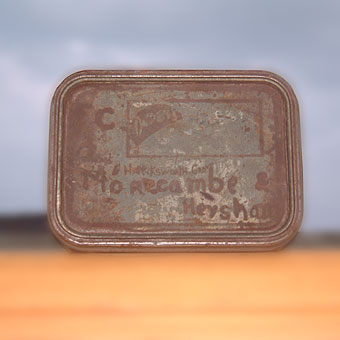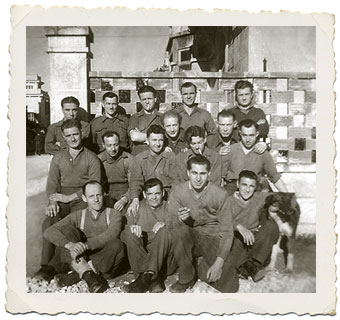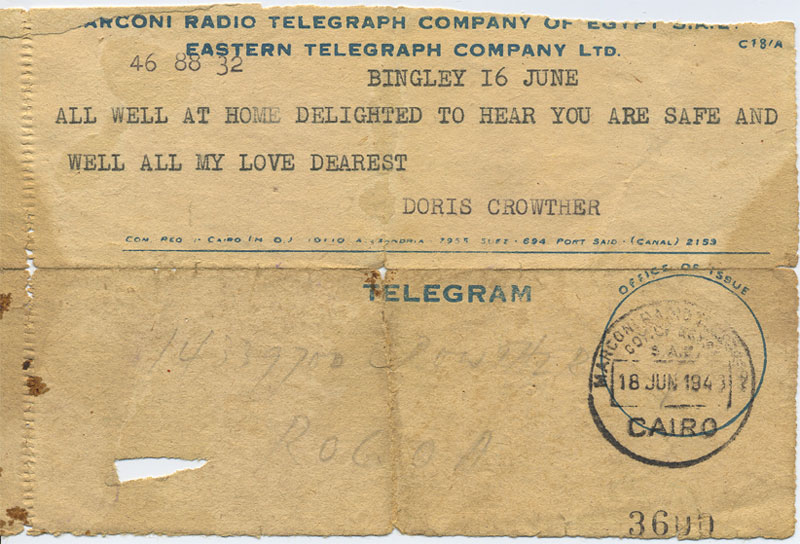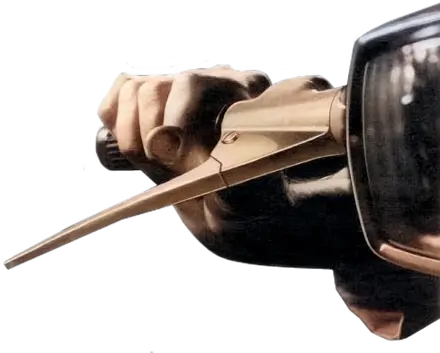Fred’s wartime tin
Every now and again I pull out the tin and sift through its contents, photographs and other small treasures which my Grandad thought important.
The 10th of this month sees the 60th anniversary of the end of World War 2 and with various celebrations planned by the British Legion and others, I am reminded of a small metal tin given to me by my Grandmother, which was carried through the war by my Grandad.
My late Grandad, Fred was a carpenter in the North of England (if you were ever in Morecambe in Lancashire up until the early 80’s, the gates to Happy Mount Park were Fred’s creation.) Fred built and maintained illuminations in Morecambe for much of his working life and he and my Grandmother Doris (now 93) ran a guest house in that Northern holiday town until the late ’60s.
Fred was called up to the army at the start of the war and like many ordinary working-class men he spent the war years abroad away from his wife and young children. He served as an engineer in the Royal Signals regiment and spent his time in North Africa and Italy. I’ve started to research a little of what Fred did during those years by contacting the regiment archives and my next step will be to pay a visit to the Historical Records Office in London. What fascinates me most about military history is not the bigger, political picture but the stories of ordinary working-class men like Fred who made enormous personal sacrifices.
Which brings me to Fred’s tin.

A few small treasures
Fred carried this small metal tobacco tin throughout the war years and Doris gave it to me a few years ago for safe-keeping along with Fred’s medals (my mother sees no sentimental value in such things). Every now and again I pull out the tin and sift through its contents, photographs and other small treasures which Fred thought important. They are now important to me too, although I know little of their true meaning.




I thought I’d share them, they mean a lot.
Replies
-
#1 On June 30, 2005 12:08 AM Ian Fenn said:
Somehow a mobile phone or PDA just doesn’t seem the same. Touching. All the best,
-
#2 On June 30, 2005 02:14 AM Chris Lienert said:
It’s the personal things like this that are really important when we say "lest we forget". Thanks for sharing!
-
#3 On June 30, 2005 03:03 AM Matt Robin said:
Fascinating tin! An interesting read, cheers.
-
#4 On June 30, 2005 09:56 AM Jon Hicks said:
Wonderful, thanks for sharing Andy
-
#5 On June 30, 2005 02:00 PM Mike Stenhouse said:
From the summary in Bloglines I was expecting a Christopher Walken Pulp Fiction speech about that tin! I love family history. We’ve not got a lot of wartime memorabilia at home, apart from my Grandpa’s Black Watch kilt—sadly my Nanna decided to throw a lot of this sort of stuff away, but we’ve got loads of old photos and I love looking through them. It’s a little window on a time I just can’t imagine, despite seeing it in umpteen films. I particularly like that telegram. Not sure why.
-
#6 On June 30, 2005 08:03 PM Andy Saxton said:
Makes you think what we will leave for our grandchildren doesn’t it?
“Here’s Grandads old G10 Powerbook”
Just not the same is it.
-
#7 On July 1, 2005 08:07 AM Ms. Jen said:
My grandpa Bill Hanen served WWII in India, stationed near Agra, as a cargo plane (C-42) pilot who ferried supplies over the Himalayas from India to China. At his 88th birthday this year, he handed me a small bit of rolled up cream silk with a note in it.
It was a piece of theJapanese parachute that came down near them when in China. He tells many stories of flying the C-42 over The Hump. My favourite things are his photos of Agra and when he received the telegram that informed his that his first son, my dad, was born safe and sound on Feb. 2, 1943. I hope to get copies of those photos made.
-
#8 On July 1, 2005 03:30 PM Dave said:
Indeed personal items really are the most treasured parts in remembering the war.
-
#9 On July 4, 2005 11:34 AM Chris Hunt said:
Great post Andy, but one small correction, the 60th anniversary of the end of World War 2 is on August 15th. I don’t know why the British Legion has picked July 10th for the celebrations, maybe it’s halfway between VE and VJ days? Maybe they’re trying to avoid the 60th anniversary of Hiroshima?
My Dad was in the Royal Signals during the war too (he started a family really late, ’kay?). He’s unlikely to have met your grandad though, as he did his service in India. Since you’re interested in the common mans’ experience of WWII, I’ve been dying to pass on this anecdote to somebody which I heard for the first time (via my mum) a few weeks ago. I suppose he didn’t think it suitable when we were kids.
When my dad was in basic training, he was out on the firing range with the rest of his comrades. Their marksmanship wasn’t up to much, and the corporal was getting more and more annoyed with them. Finally, in exasperation, he said “if your shooting doesn’t get any better, you won’t get sent overseas.” Well, of course, after that threat, the men’s shooting went all over the place. Didn’t save them from getting posted though!
I love that story. That generation weren’t a bunch of noble, self-sacrificial superheroes. They were ordinary blokes like you and me, called upon to do something extraordinary. They rose to that challenge and thank God that they did.
-
#10 On July 8, 2005 12:08 AM Anura said:
My wife inherited from her great-grandmother a suitcase full of letters to and from her youngest brother, killed in France in the First World War, and other family and friends serving overseas. What I find so tantalising is that the letters have an immediate and everyday quality (eg. “how is so-and-so,” “good to hear that little Jimmy is doing well in school”) but that the people they talk about will largely be unknown to us—there is no-one left to explain who little Jimmy was.
The touching thing is that the suitcase represents one old lady’s lasting commitment to the memory of her young brother. She lived well into her 90s and so kept the letters for over 70 years. We have now donated the originals to our (Australian) War Memorial who kindly copied the whole lot for us. We have now got copies of his war service records (he went AWOL a few times!).
Just to remark on what a few others have said, we went for a behind the scenes tour of the War Memorial last year and had a chat to a records curator. One of her challenges is that in the days of email and SMS, where exactly are the lasting records? Is it likely that emails from a servicement in say Timor would have been kept by his family? Thanks for the post. It’s good to remember the important people in our lives.
